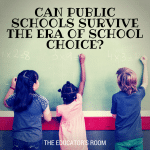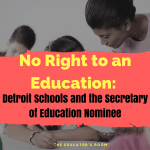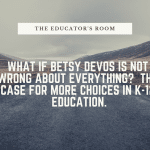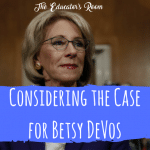The words school choice have been heard a lot in 2017. Specifically, “school choice” is a phrase most often associated with controversial Secretary of Education, Betsy DeVos. As an educator with experience in virtual education, higher education, and in brick-and-mortar secondary education, many friends and family members have been asking my thoughts on DeVos and on the Trump administration’s push for school choice voucher programs. They want to know: from a teacher’s perspective, how do I think school choice, if implemented, could affect teachers, students, schools and communities? The answer to that question is not so simple, as school choice is a multi-faceted issue.
School choice may have become a hot button issue in the wake of the 2016 election; however, this is not a new term. The idea of school choice can be traced back to the 1960s and 1970s as it related to segregation in public schools. The idea has since evolved – although many do fear that school choice could potentially lead to further segregation of U.S. schools – and has been discussed as a solution for U.S. education since the 1990s (if not earlier).
[bctt tweet=””school choice” can be traced back to the 1960s and 1970s as it related to segregation in public schools” username=”EducatorsRoom”]
What is school choice?
School choice provides education options and alternatives to traditional public schooling, largely through voucher programs. Currently, students are “assigned” to a public school based upon where they live, as county lines and other dividers dictate district locations. What the school choice platform aims to do is to allow students to both potentially choose to attend public schools outside of their traditional district, and with the inclusion of a voucher program, it could potentially allow students to attend both private and charter schools by allocating the voucher towards tuition costs, etc. There are positives associated with school choice. For instance, the parent and student gain the option of choosing the best school for their child, rather than having to attend a public school nearby. In addition, students who are not be able to afford private schools, may have a better shot at attending those schools as the vouchers could offset some hefty tuition costs.
That sounds like a pretty good deal, so what’s the catch? Why are so many people against it?
Even with some of the benefits described, this is an issue that has been hotly debated in recent years, as many take issue with the idea that federal funding – by way of vouchers for school choice – would be effectively funneled into private and religious schools rather than public schools, especially considering that these schools are not subject to the same standards and guidelines that public schools must abide by.
While idea of school choice sounds fairly cut-and-dry, it is much more nuanced than it may appear on the surface. One of the dangers that many fear with a voucher system is that public education (which is already failing) will be threatened, thus causing schools to close down or causing them to lose funding which would make providing a good education to the students who do attend very difficult. Ultimately, many see “school choice” as a band aid to try to fix a much larger problem with education in America.
School Choice in Michigan and the issues with charter schools
One of the largest concerns that people have regarding school choice is the re-allocation of federal funds into charter schools, which do not have the same levels of accountability as public schools. In addition, public school practices are examined closely by state officials, whereas, charter schools have very little oversight and supervision. In her November 2016 article, “No Right to an Education: Detroit Schools and the Secretary of Education Nominee” writer Cari Harris explores the question: Is education a right? She delves into the state of public and charter schools in Michigan, specifically, Detroit, where DeVos had a significant hand in designing their voucher system. As Harris writes, about half of Detroit students now attend Charter schools, which means that funds associated with those students have been funneled out of the public school system. The issue with this, as Harris points out, is that many of these charter schools are “run by for-profit systems.” To acquire more funds, these schools would entice students to attend by promising items like sneakers to computers and anything else they could think of to sweeten the pot. In addition, because charter schools do not have the same sets of guidelines to follow as public schools, they are able to get away with practices that would not be permitted in the public school arena. Furthermore, because charter schools are not required to allow teachers to unionize, exploitation can occur and thus can be reflected in both low teacher’s salaries and poor working conditions, which negatively impacts education as a whole.
As someone who has experienced working in a charter school in Pittsburgh, PA, I can attest that concerns about working conditions and how they affect education are not unfounded. At the charter school where I worked, we were paid very little and ranked as the lowest paying school in the state of Pennsylvania. In addition, we were required to work overtime hours without pay, because we were salaried, but then were docked pay if we needed to leave early or use a sick day. These practices, among others, caused low morale for teachers and a high turnover rate, which did not bode well for the “at-risk” population that we worked with.
Since the implementations in Michigan, Detroit is now ranked among the lowest reading and literacy scores in the United States. Part of this can be attributed to the fact that charter schools are not held accountable in the same way as their public counterparts. And, given the unethical practices of quid pro quo by these schools, one must wonder about the motives held by some charter school officials and administrators.
Even with what is happening with charter schools in Detroit, that is not to say that charter schools do not have place in education, as many charter schools provide platforms in STEM and the arts to further students in their future careers. That being said, various conclusions can still be drawn regarding school choice and its place in the United States. While many may agree that there are problems with the current education system, it is less clear, to most, what the solutions to those problems are.






